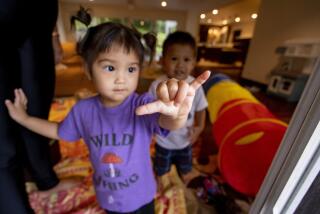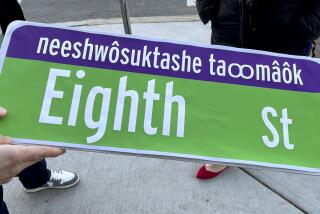Talks of the Town : Can Hawaiian Pidgin and Other Dialects Prevent Us All From Sounding Like Merv Griffin?
- Share via
I have now and then observed that the English language was being homogenized by television.
I noticed that Hollywood actors, newscasters and talk-show hosts all spoke the standard vernacular, or something close to it, and since this language was heard throughout the land, in every house and hovel, I thought we we would all soon talk like Merv Griffin or Tom Brokaw.
I am disabused of this notion by the erudite Robert Burchfield, editor of the upcoming four-volume supplement to the Oxford English Dictionary. Burchfield recently told U.S. News & World Report:
“The notion that the English language is becoming homogenized is simply a myth of the media. Dialects are on the increase. If you live in a particular township, you want to be different from the next township. This is an inescapable fact of life. The principle of social differentiation has not been deflected by the War of the Roses, the invasions of the Vikings and the Normans, the Civil War in England, the Industrial Revolution. Nor will it be changed by the mass media.”
I am pleased to know that dialects are not an endangered species. They add charm, wit and perspective to the language. A dialect is to English as a fun-house mirror is to our image of ourselves.
How I would miss Ozark, in which frash means fresh , as in “Them eggs ain’t frash”; oral means oil , as in “Your cyar needs two quarts of oral,” and rah cheer means right here , as in “He was borned rah cheer in this town.”
Jimmy Carter’s election gave us a renewed awareness of the inflections of the Southern plains: bone , as in “bone and braid in Georgia”; cayut , a domestic feline, and cram , a felony or misdemeanor.
It would also be a shame to lose such gems of Australian (Strine) as outback , the Australian interior; wowser , a rigid moralist, and bash , a festive gathering.
But to me the most charming of dialects is Hawaiian pidgin. It is a mixture of Hawaiian, English, Portuguese, Japanese, Samoan, Tongan, teen slang and genius--satirical, graphic and lyrical.
When my wife and I lived in Honolulu before the war, a haole (mainlander, white person) had to learn pidgin to get on. The mark of a kamaaina (old-timer) was his mastery of it.
Recently, Cary McSquid of Manhattan Beach wrote me about an exchange that he overheard between two beachboys outside the Outrigger Canoe Club in about 1950.
1st beachboy: “Otsamatah you?”
2nd beachboy: “Otsomatah you ?”
1st beachboy: “Otsomahtah me ? You otsomatah?”
This tone of friendly banter is common in pidgin. “ Otsomatah you? “ of course means “What’s the matter with you?” and is usually spelled, I believe, “wassamattayou.” The word is used in a song:
Wassamattayou last night? You no lik-a me no more?
When I first went to Hawaii I lived on the beach. Red McQueen, sports editor of the Honolulu Advertiser, took me in to work nights--while he was out socializing--and to make up his page for him. What he did, mostly, was write a daily column called “Hoomalimali,’ a Hawaiian word that is pronounced “ho-oh-mal-i-mal-i” and means applesauce, roughly.
Because there is so rarely anything that could be called weather in Hawaii, we ran a little weather box on Page One called “Sol Says,” and it rarely said anything about the weather. Usually it was some local joke, usually in pidgin. I once contributed a Sol Says. It read, “Sam the beachboy says, ‘Why we have signs say No u turn? Should say, U no turn.’ ” It might have added that the weather was balmy.
That was probably my finest contribution to Hawaiian culture.
A very useful Hawaiian word is pupule , pronounced “pu-PU-lay,” which means crazy. A song played mostly for tourists is: “Princess Pupule has plenty papaya / She loves to give it away.”
According to a Newsweek article in March, 1983, pidgin was then very much in vogue. It had not only become the respectable language of blue-collar Hawaiians but was also spoken by hip haoles .
The Hawaiian House of Representatives encouraged the use of pidgin by resolution, its sponsor urging passage “or fo’ real we going lose da real local style.”
An essential of pidgin is the phrase da kine . It is ubiquitous, like y’know , and means whatever you want it to mean. It can be an ambiguous euphemism, as in “Dat wahine, she da kine wahine.”
Another Hawaiian word that remains useful to my wife and me is pau , meaning finished. You say something is pau when it’s over, like a love affair, or irremediably broken, like a dishwasher. Pau is beyond repair.
Meanwhile, I hope you all have da kine Mele Kalikimaka !
More to Read
Sign up for Essential California
The most important California stories and recommendations in your inbox every morning.
You may occasionally receive promotional content from the Los Angeles Times.













